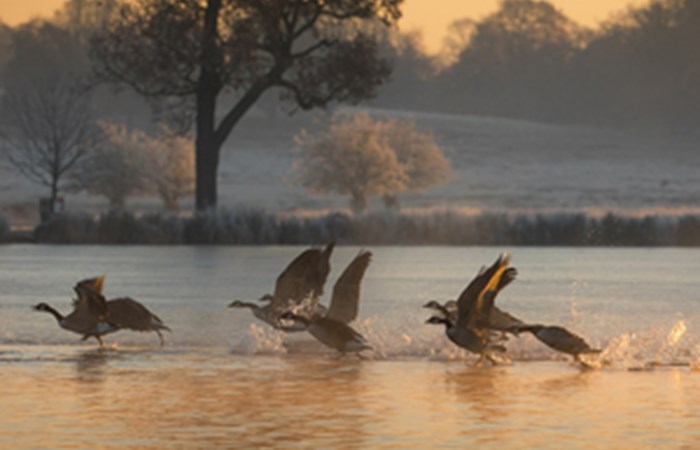Animal Plant Health Agency

Contents:
- Latest situation
- All bird flu cases and disease zones
- Bird flu guidance
- Vaccines
- Latest GOV.UK news stories
- Risk levels and outbreak assessments
- Wild birds
- Bird flu webinars
- Defra policies and contingency plans
- Bird flu legislation
Latest situation
Great Britain (England, Scotland and Wales) is in an avian influenza prevention zone (AIPZ). By law you must follow strict biosecurity rules to prevent bird flu and stop it spreading.
The AIPZ in England and AIPZ in Wales also means you must house your birds to protect them from bird flu.
In the United Kingdom, there have been 176 confirmed cases of highly pathogenic avian influenza (HPAI) H5N1 since 1 October 2022:
- 149 cases in England
- 21 cases in Scotland
- 5 cases in Wales
- 1 case in Northern Ireland
There have been 284 cases of (HPAI)H5N1 in England since the H5N1 outbreak started in October 2021.
In the United Kingdom, there has been 1 confirmed case of low pathogenic avian influenza (LPAI) H7N3 since 1 October 2022. This case was confirmed in Scotland on 20 March 2023.
Check if youre in a bird flu disease zone on the map.
If youre in a bird flu disease zone you must follow the rules for that zone and check if you need a licence to move poultry, poultry by-products, eggs, material or mammals.
Update 11 April
Following successful completion of disease control activities and surveillance in the zones, the 3km protection zone has ended and the 10km surveillance zone has been revoked for the following locations:
- premises near Mileham, Breckland, Norfolk (AIV 2022/131)
- premises near Dereham, Breckland, Norfolk (AIV 2022/150)
- eighth premises near Dereham, Breckland, Norfolk (AIV 2022/157)
- tenth premises near Dereham, Breckland, Norfolk (AIV 2022/178)
- eleventh premises near Dereham, Breckland, Norfolk (AIV 2022/184)
- premises near Colkirk, Breckland, Norfolk (AIV 2022/197)
- second premises near Mileham, Breckland, Norfolk (AIV2022/219)
Avian influenza prevention zone (AIPZ): mandatory housing
The Chief Veterinary Officer has announced that mandatory housing measures for poultry and captive birds, which were introduced across England to help stop the spread of bird flu, will be lifted from 00:01 on Tuesday 18 April 2023, but scrupulous standards of biosecurity remain essential. The measures in Wales will be lifted at the same time.
Following ongoing monitoring using the latest scientific evidence and a robust risk assessment, bird flu risk levels have been reduced meaning poultry and other captive birds will no longer need to be housed and can be kept outside, unless they are in a protection zone or captive bird monitoring controlled zone.
The decision means that from 18 April, eggs laid by hens with access to outside range areas can return to being marketed as Free-Range eggs.
Those who intend to allow their birds outside are advised to use the upcoming days to prepare their outside areas for the release of their birds. This will include cleansing and disinfection of hard surfaces, fencing off ponds or standing water and reintroduction of wild bird deterrents.
Update 8 April
Following successful completion of disease control activities and surveillance within the zones, the 3km protection zone has ended and the area becomes part of the 10km surveillance zone.
- third premises near North Somercotes, East Lindsey, Lincolnshire (AIV 2022/160)
- fourth premises near North Somercotes, East Lindsey, Lincolnshire (AIV 2022/167)
All bird flu cases and disease zones
Find details of all bird flu cases and disease zones in England.
Find details of bird flu cases in Scotland, cases in Wales and cases in Northern Ireland.
Bird flu guidance
Find out how to:
- spot and report bird flu in poultry and other captive birds
- report dead wild birds
- prevent bird flu and stop it spreading
- follow the rules in disease zones
- house your birds safely
Vaccines
You cannot vaccinate poultry or most captive birds against bird flu in England.
You can only vaccinate zoo birds in England if you meet eligibility criteria and get authorisation from APHA. Only zoos or collections holding a current zoo licence can apply for vaccination.
Defra continues to invest in bird flu research and monitors the situation globally.
We work with the Veterinary Medicines Directorate (VMD) to monitor the development of vaccines for birds.
Latest GOV.UK news stories
Mandatory housing measures for all poultry and captive birds are now in force across England.
Find details of the measures that apply in England: AIPZ declaration including housing measures.
New package of measures announced to support poultry industry with bird flu.
Risk levels and outbreak assessments
The risk of highly pathogenic avian influenza (HPAI) H5 in wild birds in Great Britain is assessed as high (the event occurs very often).
The risk of poultry exposure to HPAI H5 in Great Britain is assessed as:
- medium (event occurs regularly) (with high uncertainty) where there are substantial biosecurity breaches and poor biosecurity
- low (event is rare but does occur) (with high uncertainty) where good biosecurity is applied
Find details of the ev
